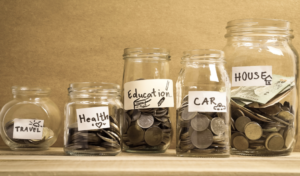 When somebody asks you, “What’s the best way to save money?”, you may find that it's an impossible question to answer.
When somebody asks you, “What’s the best way to save money?”, you may find that it's an impossible question to answer.
Not because there isn’t one, but the fact that there's so much to cover. From personal finances to banking and even couponing, there are so many ways that you can take charge of your finances.
Here are our 25 simple tips to help you save money:
How to manage your personal finances to save money
Let’s start off with the basics. In order to get your finances in line, you need to get the fundamentals right. Here are our 5 top tips for managing your personal finances:
Tip 1: Damien’s Money MOT
To truly be in control of your money, it’s important to know where things might need improving. Much like you get a yearly check-up on your car to check everything is fine, it’s worth doing a similar thing with your money.
Damien's Money MOT is a great tool to help you understand your finances. It helps you to pinpoint the areas that need improving and even let you know how you shape up compared to everyone else that has taken the MOT.
By answering a set of simple questions, you’ll be given a personalised rating based on your finances. You can find out what needs to be worked on as well as the things you’re already doing well.
Even if you think you’re on top of everything, it’s worth taking the MOT to give you suggestions on things you hadn't considered, such as insurance you may need or benefits you may be eligible for.
Tip 2: Budget from your phone
If you struggle to keep track of where your money is, or you want to work out exactly where your money is going, it might be worth downloading a budgeting app for your smartphone. There are plenty for you to choose from, all of which have unique features.
Most budgeting apps allow you to view all of your accounts in one place, so you can always see where your money is. They may also show you your credit cards, loans and any other debts you may have.
Some budgeting apps divide your spending into different categories, so you can see how much you’re spending in each area. For example, it’ll tell you that you’re spending £100 on Nando’s a month - which might be the shock you need to cut back.
There are both free and paid apps that you can choose from, but each has its own pros and cons. See our best budgeting apps guide to help you decide which one is best for you.
Tip 3: Automatic savings apps
If you’re not good at remembering to put money away at the end of the month, having a savings app on your phone might be the answer. There are plenty to choose from, all of which save your own money in small increments so you don’t have to remember - and it builds up over time.
If there’s something big that you need to save up for, you can chip away at it in small amounts. Depending on the app, you can either move small amounts of money over regularly, or round up everything you spend to the nearest pound, and save the difference.
All the apps are free, and it means you can save money passively without you even thinking about it. See our best savings apps guide for all the info you need.
Tip 4: Keep an eye on your credit score
The higher your credit score, the more likely you are to be accepted for financial products, such as credit cards and loans - but you’ll also get access to better deals and lower rates.
Although checking your credit score won’t save you money, it’ll let you know what you need to do in order to improve it, so you can get better deals. There are lots of credit checking agencies out there and it's possible that you'll score differently on each, as each website will have its own scoring system.
A good place to start checking your credit score is through services such as Experian, Equifax or TransUnion. We share how you can check each for free in our article, 'How to check your credit score for free'.
Tip 5: Get free money by switching bank
If you’re not happy with your bank, or just want some free cash, you can take advantage of switching incentives provided by a number of banks.
Right now, you could get up to £200 for switching to Lloyds Bank, up to £180 for switching to NatWest, up to £175 for switching to Nationwide or First Direct, while Santander and Co-operative Bank are offering up to £150 when you switch to them.
Switching banks is simple, you can switch using the Current Account Switching Service (CASS) and they will do all the hard work for you. Your direct debits and salaries will be transferred to your new bank - and you get the cash for free. Find the best offers in our article, 'Best current account switching offers, cashback & incentives'.
Best ways to save money on your bills
Keeping track of all your bills can be tricky - but add them all up, and they likely make up the biggest proportion of your monthly expenditure. That’s why reducing your bills (or controlling the cost to start with) can end up saving a good amount of money. Here are our 5 tips to save money on your bills:
Tip 1: Earn cashback on your purchases
JamDoughnut* is an app that rewards users with cashback for buying digital vouchers and gift cards for hundreds of retailers including grocery retailers such as ASDA, Iceland, Morrisons, Tesco and Sainsbury's. You can earn between 1% and 20% cashback which is credited to your wallet as soon as you complete a purchase. It's worth noting that the deals regularly change and so you need to act quickly if you like the look of a particular deal.
For more information on how the JamDoughnut cashback app works, how much cashback you need to earn to cash out, as well as the retailers that are supported by the app, read our article, 'JamDoughnut app review - How does the cashback work?'. We also explain how Money to the Masses readers can get a £5 first-time purchase bonus* by using the code 'MTTM'. This app is easy to use and is perfect for earning instant cashback on your normal everyday purchases, such as grocery shopping.
You can find out more by downloading the JamDoughnut app*.
Tip 2: Haggling over the phone
If you’re confident enough to pick up the phone, you can often save a lot of money just by asking for it. Whether you’re coming to the end of a contract, or you’re still in the middle of one, there's no harm in asking for a discount. If you don't ask, you don't get.
Often, the best time to haggle is towards the end of a contract. You’re likely already checking around for cheaper prices, which you can use as leverage when you go to your current provider and ask them to match or beat it.
However, you can haggle in the middle of a contract too. For example, if your phone bill is rising in price, you can always ring them up and ask them for a discount or threaten to leave. This might just prompt them into giving you a discount.
The important thing to remember is that the very worst that they can do is say "no". Even if you ring up a company and don’t get a discount, you haven’t lost anything. But if they do manage to discount your bills, it could mean a massive saving over the course of the year. For more haggling tips, read our article, 'How to haggle to get a better deal'.
Tip 3: Cancel direct debits you don’t need
It’s worth going through your bank account once a month to conduct a "direct debit audit". Always check your statement for direct debits for things that you don’t use, things you had forgotten about, or that you might have signed up to by mistake.
Be completely honest with yourself. If you’re not using your Amazon Prime subscription, or your Netflix is not being watched, consider cancelling it. You may think it’s only a small amount of money a month, but it’s just going down the drain if you’re not using it.
Also, if you know you’re going on holiday for two weeks or more, it might be worth pausing your subscriptions. If you’re not going to be at home to accept Amazon parcels, and you know you won't be ordering, then that’s a wasted £8.99.
The more frequently you check your bank statements, the easier it will be to spot and stop payments going out which might not be yours. It’s not uncommon for fraudsters to take money out of your account without you knowing, so the sooner you act, the better. Budgeting apps such as Snoop* and Emma* allow you to easily find and manage your subscriptions and regular payments.
Tip 4: Passively save money on your phone bill
A useful app for saving on the cost of your phone bill is Airtime Rewards. It’s simply an app that collates money to pay off your contract through your normal spending.
Once you link your Visa and MasterCard to the app, every time you spend at one of the retailers listed, you get some cashback. Rates can vary, but most of the time it’s between 1-5% on your purchases, and you don’t have to do a thing.
Once you’ve built up £5 or £10 (depending on the provider), you can withdraw your cash, which will be sent towards your mobile phone contract or pay-as-you-go credit.
You can earn cashback when shopping at over 200 different retailers including Boots, Argos and New Look. Once the app is downloaded, you can forget about it and just let it do its magic.
Tip 5: Save money on petrol
Fuel prices reached a record high in 2022 and with the cost of living crisis, it is good to try and save money when you can.
There is a handy tool - https://www.petrolprices.com - that allows you to check the petrol prices in your local area and navigation apps such as Waze also regularly update the local petrol prices.
In the below graphic, we share how far it is worth driving to save money on fuel. We also have more money-saving tips in our article, 'How to save money on petrol'.
(Click to enlarge)
Best ways to save money on travel
Everybody loves a holiday, but they're likely to be some of your most expensive purchases. As it's such a big expense, however, there are usually some big savings that can be made. Here are our 5 top tips for cutting costs on travel:
Tip 1: Collect frequent flyer miles
If you love to travel, it’s worth collecting frequent flyer miles. Whoever you are flying with, make sure you create an account with the airline’s loyalty scheme so that you can start to amass some air miles.
You can also accelerate your miles earnings by getting an airline credit card, transferring Tesco Clubcard points into Virgin Holiday points, or booking hotels through Rocketmiles. Once you have enough miles, you can exchange them for free flights, upgrade to business class or even get hotel stays for free.
The best way to start earning miles is by getting a British Airways American Express credit card. You can earn a free companion voucher each year if you hit a minimum spend and it doesn't even charge you an annual fee. See our British Airways American Express credit card review for all the details.
Tip 2: How to find the best exchange rate
If you’re heading on holiday, you’ll probably want to take some spending money with you. But with exchange rates so volatile, it’s hard to know where to go and when to purchase your currency.
Luckily, a tool called TravelMoneyMax will tell you which bureau gives you the best rate in your local area. Simply enter the amount that you’re willing to spend in pounds (or in the currency you need), and it’ll tell you where to go for the best rates.
If you travel abroad often and want to consistently get good rates, it might be worth getting a specialist card that doesn't charge transaction fees. Check out the best cards in our article, 'The best way to take money abroad'.
App-only banks such as Revolut and Starling Bank also offer some of the most competitive exchange rates on the market and allow you to spend abroad at no extra cost. Read our comparison article for more information, 'Revolut vs Starling Bank: How do they compare?'.
It’s important to note, however, that you should always avoid buying currency at the airport before a flight - this is where you're guaranteed to find the worst rates on the market.
Tip 3: Find the cheapest flights
Finding the cheapest time to fly to your destination can be a bit tricky, and with airline websites increasingly utilising cookies to hike up prices each time you visit, it's even harder to work out the cheapest deal. However, there is one website that should give you all the information you need to get your flights for the cheapest price.
Google Flights will present you with a calendar and tell you which day is the cheapest to fly on. In addition, it will give you a choice of airlines as well as allow you to filter by times, connections and airline groups.
If you don’t know where to fly to, you can search on the world map and see the flight prices for destinations worldwide. To see more about how it works, see our five cheap holiday tricks guide.
Tip 4: Cashback, cashback, cashback
Every time you book a holiday, you can make extra money by booking it through cashback websites. Both Quidco and TopCashback* could net you £100s when booking your holiday.
If you’re booking a hotel, you can get up to 15% cashback when booking through Hotels.com. Booking a longer stay means this could add up to a lot of money. You could also get small amounts of cashback on flights, or get cashback on package deals through Expedia.
You won’t get the money back straight away, as it may take quite a few months to become available, but it’s usually a large enough amount that is worth it when you do get it.
In order to claim the cashback, sign up to one or both of the cashback sites recommended above and search for the retailer you’re about to book through. Then click through the link and purchase as normal. Your spending will be tracked and your cashback will be logged. Simple as that.
Tip 5: Book now for the cheapest flex fares
If you’re looking at holidays for the summer, you can book fares on major airlines with flexible booking completely free. If you’re flying with Virgin or British Airways, and you wish to change your date of travel to a later time, you can do so and not pay the usual fee.
For more information on getting the best travel insurance for you, visit our top 12 tips guide.
Best ways to save money on food
Everyone needs to eat, but the costs can mount up quickly. Just heading out and getting a main course at a restaurant will set you back at least £10 across most of the UK. That’s before drinks, puddings and the tip.
That’s why it's worth figuring out if you can down the costs before you head out. Here are a few different options for you:
Tip 1: Always use a voucher
Before you go out to a restaurant, you should always look for a voucher to see if you can save yourself some cash. Quite often you can find 2-for-1 deals on main meals, 25% off your bill, or even free desserts - and all it takes is a quick Google search before you go.
Make sure you search on websites such as MyVoucherCodes, or on a restaurant chain’s offers page, and see which deals are available. You can often find vouchers to use at Pizza Express, Nando's, Costa, and many more.
Tip 2: Half price pizzas for a year
If you’re not a member of Meerkat Meals, then you seriously need to consider signing up.
This is an offer that you unlock by purchasing a qualifying product through Comparethemarket.com. You get 25% off the entire bill at participating restaurants nationwide on various days of the week, and you get 50% pizzas from Domino's, Papa Johns or Pizza Hut Delivery, 7 days a week.
There’s a trick to get the deal if you don’t need insurance too. You’re able to buy most insurances on the website to unlock the offer, and this includes the cheapest ones on offer.
If you head into travel insurance and purchase 7 days of travel insurance within the United Kingdom, this should only cost you around £5. Pick any day you like for the cover, as it doesn’t matter if you’re going away that day or not, it’s just to unlock the deal. You can even buy travel insurance for fewer days and this can be cheaper.
After your product purchase, download the Merkat app to find participating restaurants. You'll need to show your membership card screen or QR code in the app when dining out to get the 25% off deal. You can also get 50% off pizzas from Domino's, Papa Johns or Pizza Hut Delivery through the app.
Tip 3: Free groceries at the supermarket
If you visit the supermarket each week to do your food shopping and want to save some money, there’s an app that can help you save money. Shopmium is a supermarket cashback app, which gives you money back on specific items when you upload a picture of your receipt.
Scroll through the list of offers for the various products that are on sale that week and if you see one you like, head into the supermarket and buy it. Scanning a picture of the receipt will prove your purchase and the money will be transferred in to your bank or PayPal, whichever you prefer.
You can often find freebies on this app too, as well as a range of products with money off. If you see anything that you usually buy, scanning your receipt will get you some money back - so it’s always worth checking.
Tip 4: Free ‘would be wasted’ food
There are apps that can help to stop food waste as well as save you money. Two such apps are OLIO and Too Good To Go.
With OLIO, you can trade food, canned goods, extra bakes and more with your neighbours, when the food would otherwise have gone to waste. You can collect food for free, or give it away if you aren’t going to eat things yourself. It’s basically a free Facebook marketplace for food.
Too Good To Go gives away food from various high street brands at the end of the day for reduced prices. You can often get a bag of baked goods from Greggs, expiring cakes from Costa, and much more from independent brands. You do pay for these items, but it’s vastly reduced – and it stops food from going to waste.
Tip 5: Email companies for coupons
If you really love a brand, have you ever thought about telling them? It sounds a bit pointless, but getting in touch with them may end up earning you some coupons for free products. This can be especially useful for supermarket shopping.
Companies love compliments, and in return, you might get something for free out of it. The more effort you put into your complimentary emails, the more likely they are to send you something.
If you get coupons directly from manufacturers, these also tend to be worth a higher value, meaning free products when shopping - and everybody loves a freebie.
Fun money-saving tips
Here are some bonus fun ways to save some money. These might not be for everyone, but they could all add up to a lot of money in savings individually.
Tip 1: Get a free tea/coffee every day
Did you know you could pick up a tea or coffee for just a few pence every day with a little trick? It’s very easy to claim and could save you a lot for your daily caffeine fix.
If you’re signed up to the Waitrose loyalty scheme (called MyWaitrose), you get a few member benefits. One of them is a free hot drink when you make any purchase in-store, so long as you scan your MyWaitrose card. The trick with this is that there is no minimum spend, which means you can pick up the cheapest thing in the supermarket, scan it through the till and you’ll be able to get your free tea or coffee. You could pick up a banana for 16p or a carrot for 8p. So just a few pence spent can net you a free drink.
Tip 2: Start complaining!
For one reason or another, Brits tend to be very tightlipped when things go wrong. But if we don’t complain to brands when things aren’t up to scratch, then how are they supposed to improve? There's no better way to solve your issue than contacting them directly.
If there’s something wrong with your meal, speak up. If there’s a hole in your brand new jacket, send it back or request a partial refund. If that crisp packet is stuck to the side of the multi-pack meaning the contents are stale, then you better tell them.
All of these things should be fed back to the manufacturers and they almost certainly appreciate you telling them, as it could alert them to a bigger problem that they were not aware of. In return, you could get monetary compensation, coupons, or a fully functioning item for free.
Tip 3: New customer code-hopping
If you’ve shopped online for your groceries before, you’ll know that supermarkets offer large incentives to new customers who sign up and complete their first shop. Have you taken advantage of them all?
If there's an online supermarket that you haven’t used, why not do an online shop with them and get between £10-25 off your shopping? The main players with new customer codes are Sainsbury’s, Waitrose, Ocado, Morrisons and Iceland - so if you haven’t shopped at any of them, try switching for a week and see what you can save.
If you’ve never shopped online before, then you can start code hopping - by using an offer every time you need to buy some more food. Collectively, you could save well over £100 by using all of the voucher codes on the market.
Tip 4: Make money by surfing the web
Seeing adverts all over the place when you’re trying to read an article can be very annoying. Luckily, there is a way that you can change these ads into nice pictures, and get paid for viewing them.
It’s a browser plug-in called Gener8 Ads, which will overlay adverts throughout the web with pictures of pugs, sandy beaches and things that make you feel good. They get paid for you making impressions on these ads and give some of it back to you.
You’ll be paid in tokens, which you can exchange in the marketplace for Amazon vouchers, electronics, or donations to charity. It’s a great way to make your browsing more entertaining and rewarding.
Tip 5: Earn cash by completing surveys
No doubt you'll have seen this trick advertised around the internet from time to time, and it's worth taking a look. Filling out surveys on a wide range of issues could earn you £100s every year, just for giving your opinion.
Although this is by no means a quick trip to thousands of pounds, regularly completing online surveys can certainly rack up a few hundred over the course of the year, and most are free to sign up in the first place. Companies use the data from these surveys to help develop and market their products, while you get some extra money - it's a win-win scenario.
Keep in mind that rewards don't only come in the form of cash, but often as coupons and vouchers, which usually have a very limited availability date. Make sure you use your rewards before they become unviable, otherwise you could find yourself wasting a couple of hours answering questions about politics without any prize for your time.
Summary
So there we have it, those are our top 25 tips to save you some money.
You don’t have to use every single one, as it's unlikely that all of the tips will fit into your unique lifestyle, but getting your personal finances in order just takes incorporating a few different tactics into your daily habits to see some significant savings.
For more information, visit our article on where to get free financial advice or try our tips to save on your household bills. You may also find our article, '50 ways to make money' useful.
If a link has an * beside it this means that it is an affiliated link. If you go via the link, Money to the Masses may receive a small fee which helps keep Money to the Masses free to use. The following link can be used if you do not wish to help Money to the Masses - Snoop, Emma, TopCashback, Jam Doughnut






